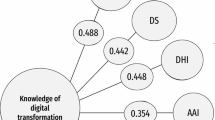Abstract
Objective
This article describes the various administrative and clinical applications for PDA use in psychiatric care and review the process for implementation in an academic medical center.
Method
The authors reviewed the psychiatric literature and tested various hardware and software products.
Results
The literature describes various uses of the PDA as a reference tool, in clinical care, and in training documentation.
Conclusions
The PDA is capable of numerous vital roles in medical education.
Similar content being viewed by others
References
Windows Mobile. Available at http://www.microsoft.com/windowsmobile/default.mspx. Accessed February 1, 2006
Luo J, Hales RE, Hilty DM, et al: Electronic sign-out using a personal digital assistant. Psychiatr Serv 2001; 52: 173–174
Luo J, Hales RE, Servis ME, et al: Use of personal digital assistants in consultation psychiatry. Psychiatr Serv 2002; 53: 271–272, 279
Mattana J, Charitou M, Mills L, et al: Personal digital assistants: a review of their application in graduate medical education. Am J Med Qual 2005; 20: 262–267
Luo J: Portable computing in psychiatry. Can J Psychiatry 2004; 49: 24–30
Bardes CL, Wenderoth S, Lemise R, et al: Specifying studentpatient encounters, web-based case logs, and meeting standards of the liaison committee on medical education. Acad Med 2005; 80: 1127–1132
Patricoski CT, Shannon K, Doyle GA: The accuracy of patient encounter logbooks used by family medicine clerkship students. Fam Med 1998; 30: 487–489
Bird SB, Lane DR: House officer procedure documentation using a Personal Digital Assistant: a longitudinal study. BMC Med Inform Decis Mak 2006; 6: 5
Armenakis AA, Harris SG, Mossholder KW: Creating readiness for organizational change. Hum Relations 1993; 46: 681–703
Author information
Authors and Affiliations
Corresponding author
Rights and permissions
About this article
Cite this article
Luo, J.S., Ton, H. Personal Digital Assistants in Psychiatric Education. Acad Psychiatry 30, 516–521 (2006). https://doi.org/10.1176/appi.ap.30.6.516
Received:
Revised:
Accepted:
Published:
Issue Date:
DOI: https://doi.org/10.1176/appi.ap.30.6.516




